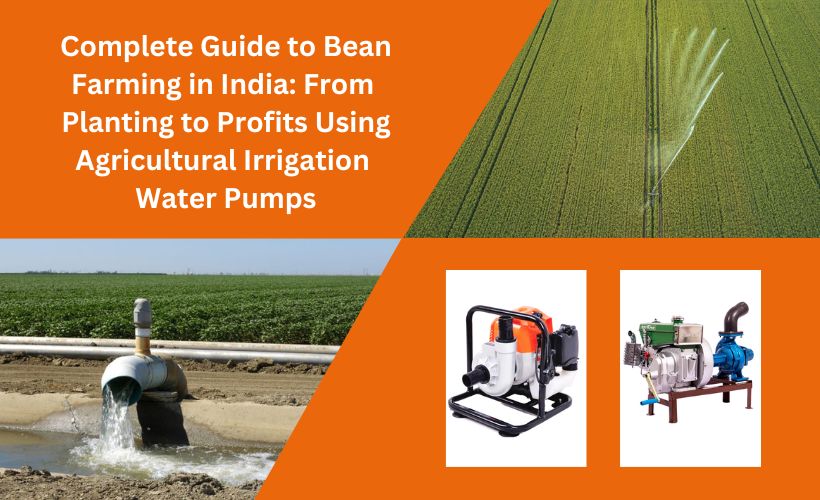Bean farming in India is a well-established agricultural practice, valued for its versatility and high nutritional content. With the right farming methods and tools, especially efficient irrigation systems, bean farming can yield great profits. This guide delves into the essential steps for successful bean farming in India, focusing on the role of the agricultural irrigation water pump in ensuring optimal crop growth.
Choosing the Right Bean Variety
The first step in successful bean farming is selecting the appropriate bean variety based on your region’s climate, soil type, and market demand. Commonly grown beans in India include:
1. Rajma: A large, kidney-shaped bean known for its rich flavor and nutritional benefits.
2. Urad Dal: A black gram variety used extensively in Indian cooking, especially in dal.
3. Mung Dal: This green gram variety is popular for making sprouts and dal, is widely used in Indian households.
Preparing the Land
Proper land preparation is essential to maximize bean production. Follow these steps:
1. Tillage: Plow the soil to a depth of 10-12 inches to loosen it and remove any weeds.
2. Fertilization: Enrich the soil with organic or inorganic fertilizers to provide essential nutrients for healthy plant growth.
3. Manure: Mix well-decomposed farmyard manure into the soil to improve its fertility and water retention capabilities.
Sowing the Seeds
Correct sowing practices are critical to ensure strong bean growth. Here’s how to do it:
1. Timing: Sow the seeds at the right time, based on the local climate and growing season.
2. Spacing: Maintain proper spacing between seeds to allow room for each plant to develop.
3. Depth: Sow seeds at a depth of 1-2 inches to ensure they germinate properly.
Irrigation and Water Management
Effective irrigation is crucial in bean farming, particularly during dry periods. Here’s how to manage water efficiently:
1. Agricultural Irrigation Water Pump: Use an agricultural irrigation water pump to ensure even distribution of water across your fields. This tool is vital in regions where water management is essential for crop success.
2. Agriculture Motor Pump: For larger fields, an agriculture motor pump provides the necessary power to move water efficiently. These pumps are suitable for supplying water to bigger areas without manual labor.
3. Diesel Water Pump for Farming: A diesel water pump for farming is a reliable alternative in areas with inconsistent electricity. It ensures that your crops receive water even in off-grid locations.
4. Drip Irrigation: Using a drip irrigation system to save water and improve efficiency. This method delivers water directly to the roots, reducing waste and ensuring that plants receive the moisture they need.
5. Water Pump for Agriculture: The use of a water pump for agriculture is key in managing water resources efficiently, especially in regions prone to droughts or water scarcity.
Pest and Disease Control
Keeping pests and diseases under control is crucial to protecting your bean crop:
1. Monitoring: Inspect your fields regularly for signs of pests or diseases. Early detection will prevent larger outbreaks.
2. Integrated Pest Management (IPM): Implement IPM strategies to control pests while minimizing the use of chemical pesticides.
3. Biological Control: Use natural predators like ladybugs to help manage pest populations without harming your crops.
Harvesting and Post-Harvest Handling
Timely and careful harvesting ensures you get the best quality beans:
1. Timing: Harvest beans when they reach maturity. Size, color, and tenderness will indicate when they are ready.
2. Method: Beans can be harvested by hand or with mechanical harvesters, depending on the scale of your farm.
3. Post-Harvest Handling: Handle the beans carefully to prevent damage during processing and storage. Proper handling ensures they retain quality and fetch a good price in the market.
4. Drying: If necessary, dry the beans to reduce moisture content. This is important for longer storage or transportation.
Conclusion
Bean farming in India is a profitable venture with the right approach. Using modern tools such as the agriculture motor pump, and diesel water pump for farming ensures that your crops receive adequate water, even in challenging environments. Water management is a key factor in the success of your crop, and utilizing efficient irrigation methods like water pump for agriculture ensures higher yields and better profits.
By following the recommended steps for bean cultivation, including land preparation, seed sowing, irrigation, pest control, and harvesting, you can maximize your farming output. Tailor these practices to your local climate and market demands to ensure sustainable and successful farming.
FAQs
Q1. What are the benefits of using an agricultural irrigation water pump in bean farming?
An agricultural irrigation water pump ensures efficient and uniform water distribution across your fields, which is crucial for maintaining consistent moisture levels for bean crops. This helps in promoting healthy plant growth and maximizing yields, especially in areas with irregular rainfall or water availability.
Q2. How does a diesel water pump for farming compare to other types of water pumps?
A diesel water pump for farming is particularly useful in regions with unreliable electricity. It offers a reliable water source for irrigation without the need for electrical power, making it ideal for remote or off-grid areas. Compared to electric pumps, diesel pumps are often more powerful and can handle larger volumes of water.
Q3. When should I consider using drip irrigation for my bean crops?
Drip irrigation is recommended when you want to maximize water efficiency and minimize wastage. It is particularly beneficial in regions with limited water resources or where precise water delivery is needed. By providing water directly to the root zones, drip irrigation helps in reducing evaporation and runoff, promoting better plant health and higher yields.




